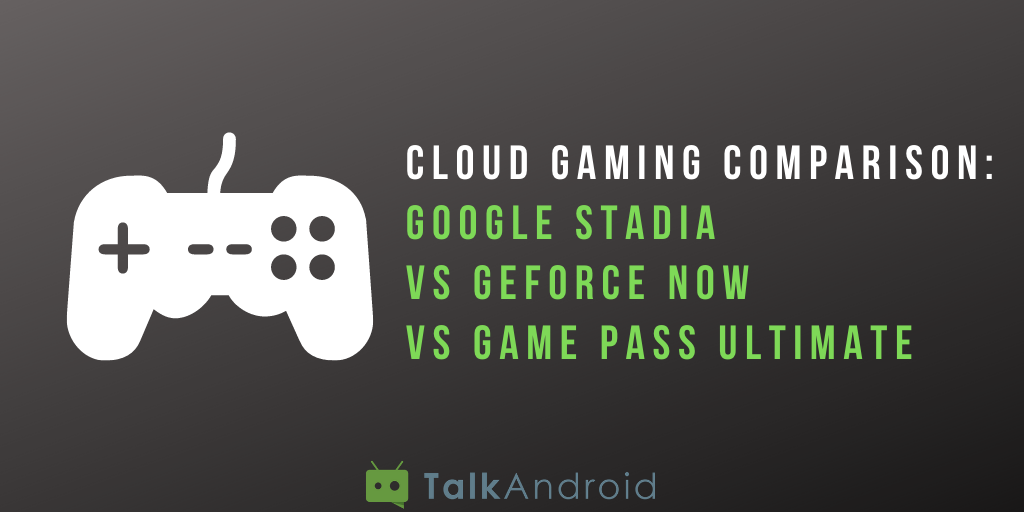
Playing games on local hardware is so 2018. These days it's all about streaming games to your phone or laptop and playing everything in higher settings without stressing your hardware, and you've got plenty of options.
The big three right now are Google Stadia, NVIDIA GeForce Now, and the upcoming-but-currently-in-beta Microsoft Game Pass Ultimate. They've each got their own perks and drawbacks, and we're going to dive in and see which streaming service is the right option for you.
Availability
There's probably nothing more important than how you can actually play your games when it comes to these services. The devices and controllers you can use and stream to will make or break whether you actually sign up for a service; if you're exclusively using a streaming box that Stadia doesn't support, for example, you're not going to want to buy in.
Google Stadia runs on lots of devices, especially since it's opened up to more Android smartphones. Technically only a handful of higher-end, popular smartphones are officially available to stream Stadia games, but Google has enabled an option in the Stadia app that will let you test streaming it to just about any phone or tablet. They can't guarantee performance, but in our experience it works pretty well more often than not.
You can also stream games to a Chromecast Ultra and on any laptop or PC that can install Google Chrome. That opens up low-powered devices like cheap laptops and Chromebooks, but there are still limitations. iPhones and iPads can't stream Stadia games, and Android TV is a very surprising limitation considering it's Google's own platform.
Stadia also works with a variety of controllers, although you're limited to the Stadia Controller on Chromecast. Otherwise you can use most other gamepads, or a mouse and keyboard.
NVIDIA's GeForce Now manages to stay pretty competitive with Google, with one key addition; it works on the NVIDIA Shield. So not only do you get the full slate of the GeForce Now streaming library on your phone, tablet, and computer (which also includes running on Chromebooks now) but you can turn your favorite media streaming box into a full home console.
That also means you can use more controllers with your TV, including things like Xbox controllers. You can't use the Stadia controller with GeForce Now, but everything else including a mouse and keyboard is supported.
Game Pass Ultimate is generally the most restrictive of the three here, only working on Android phones and tablets. iOS is once again excluded, although that's not Microsoft's fault. There's no way to stream games to your laptop right now, but Microsoft does have an ace up its sleeve if you've got decent hardware. Instead of streaming, you Game Pass Ultimate will let you install tons of games to your device and play on your local machine. That does kind of defeat the purpose of a game “streaming” service, but it does open things up if you're not around internet or you've already got an Xbox underneath your TV.
Peripheral support is also pretty limited, but Microsoft does offer some branded accessories with third parties to enhance your experience.

Tie: GeForce Now & Stadia
It's hard to pick a winner between GeForce Now and Stadia. They both work on a variety of devices with a ton of different controllers, and they trade blows pretty evenly between the Chromecast/Shield TV support. Stadia will likely gain an edge here if it ever winds up on Android TV.
Game selection
You're going to get a drastically different selection of games depending on which route you take here, and acquiring new games differs between platforms, too.
Google Stadia is a totally new, distinct platform. It doesn't run typically PC games (although we see tons of ports) but that means you'll need to rebuy your games again on Stadia. Just because you own Red Dead Redemption 2 on Steam doesn't mean you can play it here, and you'll have to shell out another $60 to play it.
Stadia Pro does give out some really killer free titles, however, and we're starting to see more developers and publishers hop on board the Stadia train. Most games these days seem like they're launching day-and-date with their counterparts on Xbox/PlayStation/PC, too, and Stadia sometimes gets nice discounts comparable to other platforms.
But with it being such a new platform, it's a relatively small library, and none of your old stuff works here.
GeForce Now, on the other hand, only uses your existing library. If you own Far Cry 5 on uPlay or Steam, for example, you can stream it via GeForce Now. Not all publishers like this, though, and we've seen a huge exodus of titles coming and going from the catalog. Generally, though, you shouldn't struggle to find stuff to play, and your saves will even sync across devices on compatible games.
Discounts don't come from NVIDIA, but since you have the entire internet and tons of retailers to buy from, it's not hard to find PC games for cheap. Whether you're buying from Steam directly, or from third-parties like Humble Bundle, it won't cost much to build a huge library.
Game Pass Ultimate only offers access to Microsoft's compatible Game Pass library, with no way to add to it. If it's not on the service, you can't play it.
But with that being said, that catalog is huge. It's full of Microsoft first-party titles like Halo and Gears of War, plus heavy-hitters such as Destiny 2 and a bunch of other things that you'd actually want to play. Things do come and go (excluding Microsoft titles which are here to stay) but there's going to be a little something for nearly any player in Microsoft's offerings.

Winner: GeForce Now
If all you care about is having the most games available to you, GeForce Now is the way to go. The catalog of PC games is enormous, and even without support from every publisher there's still just so much stuff to play from NVIDIA's powerful cloud servers. Not having to rebuy anything is great, too.
Performance
The whole point of cloud gaming like this is to run games that your cheap Chromebook normally couldn't run, or to crank up the settings a little higher than you'd normally be able to. Sometimes this works, sometimes it doesn't.
Google Stadia, on paper, should offer the best experience. All the hardware is custom-built and the games are ported to utilize that native hardware from Google's servers, but you don't always see that reflected in the real world.
Generally Stadia does look and run very well and very consistently, but in some games, like Tomb Raider, we've noticed that they're not really maxing out settings like you'd want. If my old GTX 1080 can run Tomb Raider from 2013 in 4k @ 60fps, why can't Stadia?
But when it does work well, you'll notice some incredibly crisp and clear visuals from Stadia, and some really fast loading times that make up for it.
GeForce Now relies on a couple different varieties of hardware from NVIDIA. Normally you'll end up with RTX 2060 or RTX 2080 equivalents, or server-grade Tesla GPUs, depending on the game you're trying to play. NVIDIA tries to use the better hardware for the demanding games, but sometimes you'll end up with a card that's just barely unable to maintain 60fps for your particular game. It's not common, but it does happen.
When things are rolling, though, they look great. NVIDIA's latest GPUs are no slouch, even in the cloud.
Microsoft has fully embraced the Xbox for their streaming service, and everything you play is run on a cloud Xbox One X. Performance is generally the same, for all the good and bad that brings. You're not going to be playing very many games in 60fps simply because the games are straight console ports that don't normally support high framerates, but you do get the plug-and-play consistency of popping a disc into your Xbox.
Spinning up servers and hopping into games also seems to take the longest on Game Pass Ultimate.
Winner: Stadia
This one actually feels really close. I think NVIDIA is just on Stadia's heels, and actually performs better under perfect circumstances, but it's Stadia's consistency and built-from-the-ground-up approach that gives it the edge. If you're looking for the smoothest cloud gaming experience, stick with Google.
Value
These services try and entice users to stay in the ecosystem by offering better value through discounts, subscriptions, or platform advantages.
Google Stadia Pro delivers on this with free games every month. Sometimes you really luck out with some high-quality games like Metro Exodus, or this month where Google's giving away a whopping six games. You have to keep subscribing to play those “free” games, but it's a quick way to build up your library.
You also get regular discounts on games so you can play whatever you want and save a little money. These discounts are generally very competitive with other platforms, and you'll keep the games even if you stop paying the $10 monthly fee.
Stadia Pro also ups your streaming resolution to 4k HDR and 5.1 surround sound, so you'll have an all-around better experience. This is definitely aimed at playing on a TV or beefier setup, though; you won't care about any of that on your 5-inch smartphone with stereo speakers.
GeForce Now doesn't do quite as much here, but it does give an edge to their premium Founders Edition members. You can play for as long as you want (free members are limited to one-hour sessions) and it's the only way to get RTX-enabled graphics in your games. You also get priority access to servers over free members.
While it's not as big of an upgrade, it's also cheaper than the other two options at only $5 per month.
Game Pass Ultimate is an expanded $14.99 version of Microsoft's existing $9.99 Game Pass subscription. That's pricier than what Google and NVIDIA offer, and it's the only way to play; there is no free tier here.
But that price gets you a ton of games. It's $60 more per year than Stadia, for reference, so if you buy one full price game on Stadia that would otherwise be on Game Pass, you come out ahead. There are loads of indie titles, plus everything Microsoft offers: Halo, Gears, Forza, Sea of Thieves, and more. Madden 20 is available, Hitman is there, and things like Soul Calibur V and Civilization V and PUBG are ready to go. You don't need to buy games when you've already got everything you want.

Winner: Game Pass Ultimate
If you're wanting to build up your own library of games, I can see the appeal of Stadia and GeForce Now. But for what you're paying and what's available, Microsoft has crafted an enormous library of games that puts any of Stadia Pro's free games to shame. Even your existing PC library might not be able to compete with everything on Game Pass.
Which should you pick?
It's actually pretty hard to make this decision, honestly, but it really depends on your current gaming setup. Are you already invested into the Xbox ecosystem with your achievements and friends, or do you just want the most bang for your buck? Game Pass Ultimate is a no brainer when it launches in September, and it's not even close.
If you're deep into the PC gaming world, GeForce Now probably makes the most sense. You get a beefy catalog of available games, and this is by far the cheapest route to go based on monthly cost and how easy it is to find deals on games.
If you want the slickest, best performing option? You gotta hand it to Stadia. It works well, the apps are fun to use, and Stadia Pro hands out enough freebies and discounts to get anyone interested.



